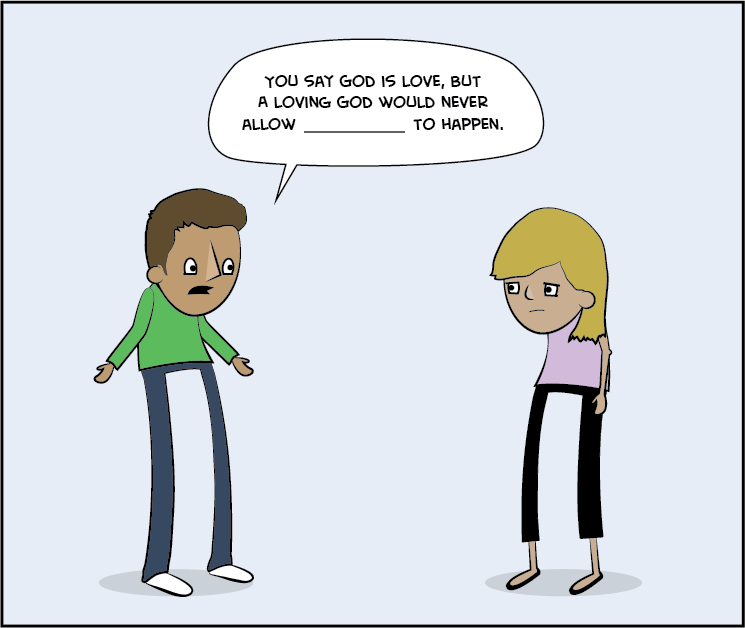Can God Love Us and Still Allow Evil?
Is it possible that a loving God would allow evil? Think about the evil we see all around the world. Rape, murder, death, accidents, suffering—all evidences of evil. If God is in complete control (i.e., sovereign), how can we justify His love when He allows such evil?
This is a common argument brought forward by unbelievers. However, it is also a question that believers ask in the midst of suffering and evil. What should our response to this kind of statement?
There are three things to remember which help us reconcile this apparent problem of evil as well as provide a proper answer to an unbeliever.
1. God defines love, love does not define God
Adam Ford has a helpful Christian comic which illustrates this point brilliantly (see full comic here).
We must not let the culture’s version of love form who our God is. The Bible not only reveals God, but it also defines who God is and how real love operates. The Bible gives the true definition of love, the culture does not.
2. God’s love is not equal
Praise the Lord for this! Sometimes we assume that God wants the best for everyone, but that is simply not true. The premier object of God’s love is Jesus Christ (cf. John 5:20-23). God displays this by giving the Son judgment over all creation and a world-wide kingdom. God does not want the best for everyone, He only wants the best for His Son. The entire plan of God is designed to ensure that His Son gets the best.
As Christians, it is because of our special relationship with the Son that we will inherit an eternal possession. Unbelievers, on the other hand, are punished because they reject the Son. God’s love is not equal for everyone. The Son is the supreme object of God’s affection, and believers have a special place with God because of their union with His Son.
3. In a world without God there is no evil
When someone says that God cannot exist because of evil present in the world, they are falling into a trap of their own making. Without God there cannot be evil. Without a Creator, there are no rules by which the world must operate; therefore, there is no right or wrong.
Many people will argue that evil is a matter of cultural consensus. The problem with that is there are plenty of historical examples where the cultural consensus led to a tremendous evil being committed. A case in point is the Holocaust. It was evil for the German Nazis to be convinced of Aryan supremacy and to exterminate the Jews on the basis of racial supremacy. Yet, it was a culturally appropriate and a popular action for that time. Majority rule is not a proper standard of right and wrong.
The morals natures of good and evil can only be properly distinguished when we have a standard by which to measure those terms. That standard is found in God himself, His revelation of His character forms that basis.
The Real Issue is not Love or Evil
Ultimately, an unbeliever who claims unbelief because of the presence of evil is simply suppressing the truth about God (Rom 1:18-23). It is often appropriate to give such unbelievers an answer, but they also need to be shown (lovingly) that they are sinning against their Creator and that they need to repent from their sin. They have already said they believe there is evil in the world. They need to be told (and shown from the Bible) that they are a part of the evil in the world. There is no perfect formula for doing this. We must pray for the Spirit to give us wisdom as we are faced with witnessing opportunities like this.



3 Comments
Negativitydeleted!
All negative replies deleted!!! Way to argue your points!
So one more item: If you actually believe that: “true greatness is not found in public display before man, but in private display before Christ” then why do you have a blog.
“is it ok to want to be great” <<< Boy , does this ever describe the delusions of Christianity.
Peter Goeman
I am thankful for an opportunity to reply to the question of why do I have a blog. I can assure you it is not because I think it will give me greatness in the eyes of anyone. I mean, you are one of the only people who has read it and I highly doubt you view me as great! :)
I simply write to help Christians think through important issues. I don’t have all the answers, but as I write about issues I often get helpful feedback which sharpens my own thinking, and have been told that on occasion my writing helps others think through issues too. In the Christian life it is inherently communal—we help one another and sharpen the thinking of one another. We are all lacking in many regards and so this helps all of us. Happy to talk about what being a Christian means if you’re interested.
You Are a fool
Maybe the worst arguments I have ever heard. A child could do better. You argue from a fallacious fallacy to begin with. There is no proof of your deity (One of thousands). To add even more idiocy to the argument you suggest that humans are incapable of defining love. Only God and/or the bible knows this. so then, you know nothing. you are not capable of free thought. The fallacies are too numerable to expound upon. You are a very deluded young man.